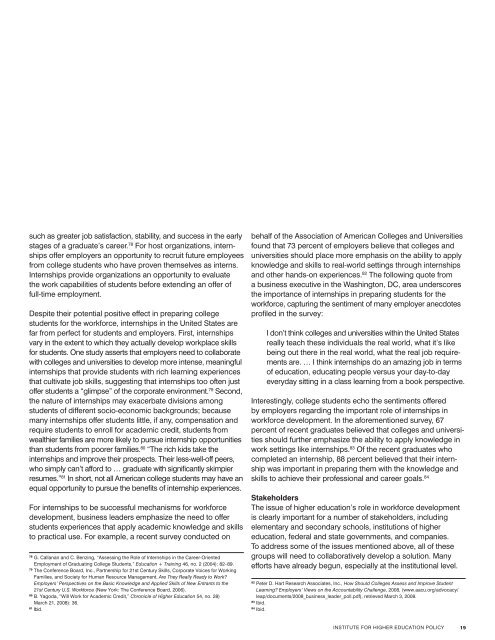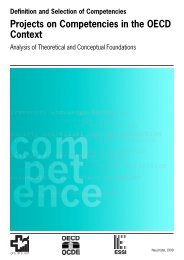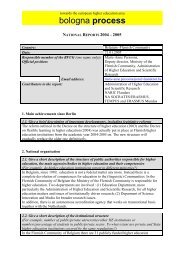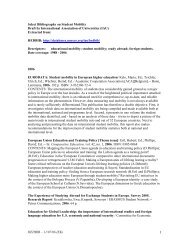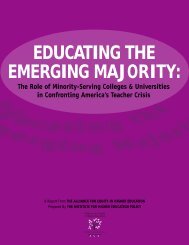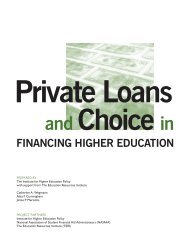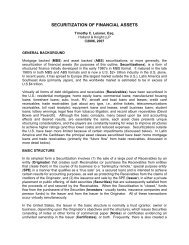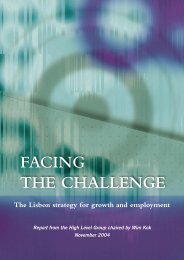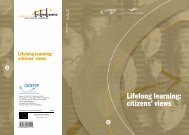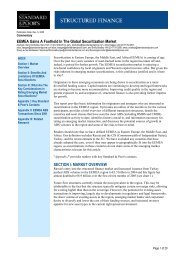figure 4Basic Skills of Four-Year <strong>College</strong> Graduates Identified as “Very Important” by American Corporations100 %80 %60 %40 %89.7 % 88.0 % 87.0 % 64.2 % 33.4 %20 %0 %writing inenglishenglishlanguagereadingcomprehensionmathematicsScienceSource: The Conference Board, Inc., Partnership <strong>for</strong> 21st Century Skills, Corporate Voices <strong>for</strong> Working Families, <strong>and</strong> Society <strong>for</strong> Human Resource Management, Are TheyReally Ready to Work? Employers’ Perspectives on the Basic Knowledge <strong>and</strong> Applied Skills of New Entrants to the 21st Century U.S. Work<strong>for</strong>ce (New York: The ConferenceBoard, 2006).competitiveness of the college-educated work<strong>for</strong>ce. A recentsurvey of more than 400 corporations provides an employer’sperspective on the work<strong>for</strong>ce readiness of college graduates. 70For employers, the three basic skills overwhelmingly identifiedas “very important” <strong>for</strong> work were writing in English, speakingin English, <strong>and</strong> reading comprehension) (Figure 4).In addition to basic skills, the survey examined the most importantapplied skills that graduates need to demonstrate on the job.Employers considered five applied skills as particularly important:oral communication (95 percent identified as “very important”);teamwork (94 percent); professionalism (94 percent); writtencommunication (93 percent); <strong>and</strong> critical thinking (92 percent).This survey also reports that although most employers characterizethe overall preparation of four-year college graduatesas either “adequate” or “excellent” (65 percent <strong>and</strong> 24 percent,respectively), they rank an alarming number of four-year collegegraduates as “deficient” in “writing in English” <strong>and</strong> “writtencommunication” (26 percent <strong>and</strong> 28 percent, respectively)<strong>and</strong> in “professionalism/work ethic” (19 percent). The shiftin expecting a rich set of work skills extends beyond jobsfilled by four-year college <strong>and</strong> university graduates to highschool graduates pursuing vocational-focused postsecondaryeducation. It is estimated that more than 40 percent of factoryjobs in the United States will require training in postsecondaryeducation by 2012. 71 Similarly, high school graduates enteringpostsecondary work<strong>for</strong>ce training programs (<strong>for</strong> jobs such aselectricians <strong>and</strong> plumbers) need comparable levels of skillsin reading <strong>and</strong> mathematics as their peers entering collegelevelacademic programs. 72 Finally, corporations seek asimilar set of basic <strong>and</strong> applied skills from two-year collegegraduates as they expect from four-year college <strong>and</strong> university70The Conference Board, Inc., Partnership <strong>for</strong> 21st Century Skills, Corporate Voices <strong>for</strong> WorkingFamilies, <strong>and</strong> Society <strong>for</strong> Human Resource Management, Are They Really Ready to Work?Employers’ Perspectives on the Basic Knowledge <strong>and</strong> Applied Skills of New Entrants to the21st Century U.S. Work<strong>for</strong>ce (New York: The Conference Board, 2006).71The National Association of Manufacturers. (2005). The looming work<strong>for</strong>ce crisis: PreparingAmerican workers <strong>for</strong> 21st century competition (Labor Day Report 2005). Washington, DC:National Association of Manufacturers.72ACT, Inc. Ready <strong>for</strong> college <strong>and</strong> ready <strong>for</strong> work: Same or different? (Iowa City, IA: ACT, 2006).graduates. 73 In short, employers expect many of the same skillsfrom prospective employees, regardless of their level of educationalattainment.InternshipsGiven perceived deficits in the skills of college graduates,business leaders consider internships an important mechanismin preparing college graduates <strong>for</strong> the work<strong>for</strong>ce. In fact, internshipsrepresent an increasingly common <strong>for</strong>m of work<strong>for</strong>ce 74development in the United States. According to the NationalAssociation of <strong>College</strong>s <strong>and</strong> Employers, 62 percent of college<strong>and</strong> university graduates employed after graduation haveparticipated in some <strong>for</strong>m of an internship. 75In general, internships in the United States offer benefits to bothcollege students <strong>and</strong> host organizations. By exposing collegestudents to real-world problems in a work setting related to theircareer interests, internships enhance students’ analytical <strong>and</strong>technical skills <strong>and</strong> emphasize the importance of “soft” skillssuch as creativity <strong>and</strong> adaptability. 76 In general, internships arepositive developmental experiences <strong>for</strong> college students, particularlyhelping students to evaluate their career interests <strong>and</strong> toacquire job-relevant skills. 77 In terms of post-internship effectson college students, research has identified positive outcomes73The Conference Board, Inc., The Partnership <strong>for</strong> 21st Century Skills, Corporate Voices <strong>for</strong>Working Families, & The Society <strong>for</strong> Human Resource Management. Are they really ready to work?Employers’ perspectives on the basic knowledge <strong>and</strong> applied skills of new entrants to the 21stcentury U.S. work<strong>for</strong>ce. (New York: The Conference Board, 2006).74Although the terms internship <strong>and</strong> cooperative education (also known as co-ops) are oftenconsidered interchangeable—<strong>for</strong> example, this paper uses them synonymously—subtle differencesexist between the two field experiences. Students in a cooperative education program typicallyalternate between a period of full-time academic study <strong>and</strong> a period of full-time, paid cooperativeemployment with organizations that may be located some distance from their institution,<strong>and</strong> the students are generally concentrated in technical disciplines such as engineering <strong>and</strong>manufacturing. In contrast, internships generally refer to part-time (or summer-only) fieldexperiences over a broader range of academic disciplines <strong>and</strong> organizational settings <strong>and</strong> donot necessarily include compensation (J. Gault, J. Redington, <strong>and</strong> T. Schlager, “UndergraduateBusiness Internships <strong>and</strong> Career Success: Are They Related?” Journal of Marketing Education22, no. 1 [2000]: 45–53).75A. Athavaley, “Students Craft Internships to Fit Interests,” Associated Press Financial Wire, March6, 2008.76M. Coco, “Internships: A Try be<strong>for</strong>e You Buy Arrangement,” Advanced Journal of Management65, no. 2 (2000): 41–4477G. Callanan <strong>and</strong> C. Benzing, “Assessing the Role of Internships in the Career-Oriented Employmentof Graduating <strong>College</strong> Students,” Education + Training 46, no. 2 (2004): 82–89.18 EDUCATIONAL POLICIES FOR INTEGRATING COLLEGE COMPETENCIES AND WORKFORCE NEEDS
such as greater job satisfaction, stability, <strong>and</strong> success in the earlystages of a graduate’s career. 78 For host organizations, internshipsoffer employers an opportunity to recruit future employeesfrom college students who have proven themselves as interns.Internships provide organizations an opportunity to evaluatethe work capabilities of students be<strong>for</strong>e extending an offer offull-time employment.Despite their potential positive effect in preparing collegestudents <strong>for</strong> the work<strong>for</strong>ce, internships in the United States arefar from perfect <strong>for</strong> students <strong>and</strong> employers. First, internshipsvary in the extent to which they actually develop workplace skills<strong>for</strong> students. One study asserts that employers need to collaboratewith colleges <strong>and</strong> universities to develop more intense, meaningfulinternships that provide students with rich learning experiencesthat cultivate job skills, suggesting that internships too often justoffer students a “glimpse” of the corporate environment. 79 Second,the nature of internships may exacerbate divisions amongstudents of different socio-economic backgrounds; becausemany internships offer students little, if any, compensation <strong>and</strong>require students to enroll <strong>for</strong> academic credit, students fromwealthier families are more likely to pursue internship opportunitiesthan students from poorer families. 80 “The rich kids take theinternships <strong>and</strong> improve their prospects. Their less-well-off peers,who simply can’t af<strong>for</strong>d to … graduate with significantly skimpierresumes.” 81 In short, not all American college students may have anequal opportunity to pursue the benefits of internship experiences.For internships to be successful mechanisms <strong>for</strong> work<strong>for</strong>cedevelopment, business leaders emphasize the need to offerstudents experiences that apply academic knowledge <strong>and</strong> skillsto practical use. For example, a recent survey conducted on78G. Callanan <strong>and</strong> C. Benzing, “Assessing the Role of Internships in the Career-OrientedEmployment of Graduating <strong>College</strong> Students,” Education + Training 46, no. 2 (2004): 82–89.79The Conference Board, Inc., Partnership <strong>for</strong> 21st Century Skills, Corporate Voices <strong>for</strong> WorkingFamilies, <strong>and</strong> Society <strong>for</strong> Human Resource Management, Are They Really Ready to Work?Employers’ Perspectives on the Basic Knowledge <strong>and</strong> Applied Skills of New Entrants to the21st Century U.S. Work<strong>for</strong>ce (New York: The Conference Board, 2006).80B. Yagoda, “Will Work <strong>for</strong> Academic Credit,” Chronicle of Higher Education 54, no. 28)March 21, 2008): 36.81Ibid.behalf of the Association of American <strong>College</strong>s <strong>and</strong> Universitiesfound that 73 percent of employers believe that colleges <strong>and</strong>universities should place more emphasis on the ability to applyknowledge <strong>and</strong> skills to real-world settings through internships<strong>and</strong> other h<strong>and</strong>s-on experiences. 82 The following quote froma business executive in the Washington, DC, area underscoresthe importance of internships in preparing students <strong>for</strong> thework<strong>for</strong>ce, capturing the sentiment of many employer anecdotesprofiled in the survey:I don’t think colleges <strong>and</strong> universities within the United Statesreally teach these individuals the real world, what it’s likebeing out there in the real world, what the real job requirementsare. … I think internships do an amazing job in termsof education, educating people versus your day-to-dayeveryday sitting in a class learning from a book perspective.Interestingly, college students echo the sentiments offeredby employers regarding the important role of internships inwork<strong>for</strong>ce development. In the a<strong>for</strong>ementioned survey, 67percent of recent graduates believed that colleges <strong>and</strong> universitiesshould further emphasize the ability to apply knowledge inwork settings like internships. 83 Of the recent graduates whocompleted an internship, 88 percent believed that their internshipwas important in preparing them with the knowledge <strong>and</strong>skills to achieve their professional <strong>and</strong> career goals. 84StakeholdersThe issue of higher education’s role in work<strong>for</strong>ce developmentis clearly important <strong>for</strong> a number of stakeholders, includingelementary <strong>and</strong> secondary schools, institutions of highereducation, federal <strong>and</strong> state governments, <strong>and</strong> companies.To address some of the issues mentioned above, all of thesegroups will need to collaboratively develop a solution. Manyef<strong>for</strong>ts have already begun, especially at the institutional level.82Peter D. Hart Research Associates, Inc., How Should <strong>College</strong>s Assess <strong>and</strong> Improve StudentLearning? Employers’ Views on the Accountability Challenge, 2008, (www.aacu.org/advocacy/leap/documents/2008_business_leader_poll.pdf), retrieved March 3, 2008.83Ibid.84Ibid.INSTITUTE FOR HIGHER EDUCATION POLICY19


